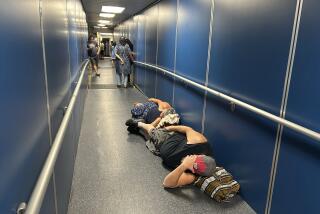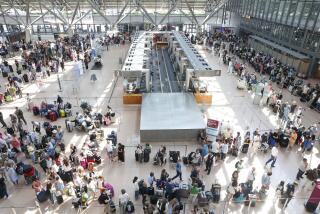New Zealand, Braced for Doom at Midnight, Finds Y2K Menace a No-Show
AUCKLAND, New Zealand — As most of California slept in the wee hours Friday, the state’s Y2K sentinels huddled over computer screens in Cisco Systems Inc.’s high-rise offices here, nervously searching for signs of technological disaster.
By 30 minutes after midnight of New Zealand’s new year, the picture was clear: At least in this tiny island nation, fears that man would become the victim of his own invention would not be realized.
The millions of dollars New Zealanders spent upgrading computer systems had made Y2K a nonevent in the first industrialized country to greet the new century.
This was good news 6,593 miles away in Sacramento, where California officials awaited the first report from the state’s “Follow the Sun” team of private and public specialists stationed overseas to spot trouble.
“It was, as I expected, a fizzle,” said Brendan Barrett, a systems engineer for San Jose-based Cisco.
Across town at Hitachi Data Systems, the scene was similar--engineers hunched over computers waiting for distress calls. None came.
“Everything seems to be operational,” said Egan Christensen, director of Hitachi’s Y2K initiative. “Our customers are doing fine. We’re doing fine. It seems the whole country is doing fine.”
Things were so quiet that New Zealand’s Y2K Readiness Commission, which had established an elaborate system for monitoring any computer meltdowns, announced it would probably shut down early.
After checking the critical sectors of the nation’s economy--gas, power, telecommunications, hospitals, water, transportation and banking--the commission proclaimed it had not found a single Y2K problem.
A water system on the North Island went out shortly before midnight, the result of a power failure. But officials determined that the cause was related to a storm.
The only other hint of trouble came from the telephone company, whose lines became congested with callers phoning friends and relatives to wish them a happy new year and report that the Y2K menace was a no-show.
“Key utilities and essential services have invested considerable time and effort in making their systems Y2K-ready,” said David Henry, the readiness commission’s deputy chairman.
“So far, their investment has been rewarded with a smooth transition.”
The two Silicon Valley-based companies, which had agreed to serve as the early-warning post here for California’s government, quickly advised state officials that if the rest of the world mirrored New Zealand, Y2K would be nothing to worry about.
In Sacramento, officials at the state’s central emergency warning center greeted that news with glee. Working around the clock, teams at the center spent Friday monitoring reports from Australia, Japan, South Korea, Israel and other nations.
After hearing the reports from New Zealand, David Lema, Gov. Gray Davis’ Y2K advisor, proclaimed the initial, peaceful episode “just a wonderful experience.
“Our wildest hopes [have] come true,” Lema said. “Y2K, from a technological standpoint, had been dealt with.”
At Cisco’s New Zealand headquarters, on the 25th floor of Auckland’s ASB Bank tower, a small contingent of three began their Y2K vigil two hours before the end of 1999.
As sounds from the city’s raucous New Year’s celebration wafted through the windows, the trio checked and rechecked computer programs, then waited. “We’re like the dipstick in the world’s engine,” said Tim Hemingway, country manager for Cisco Systems New Zealand.
Precisely at midnight, the date on the computer screens became a series of zeros. Everyone braced for the first phone call. When no calls had come after 20 minutes, someone joked, “Maybe the phones are dead. Maybe Y2K hit the phone system.”
A quick call showed the phones were working.
“We were very confident that we would sail through this,” said a relieved Hemingway, “but this is a whole lot quieter than I thought it would be.”
Shortly before 1 a.m., engineer Kevin Coghlan dialed Cisco’s emergency war room in Sydney, Australia, where 100 engineers and technicians were on duty and another 200 were on call.
“It looks good here,” he told Sydney. “I can see from my windows the street lights are working. All our systems are working. And the sheep are fine.”
*
Times staff writer Dan Morain in Sacramento contributed to this report.






